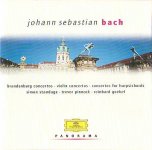No one recording of J.S. Bach’s six Brandenburg Concertos can possibly meet every demand throughout. I suppose that’s in itself an acknowledgement of the unique attributes of this music, and of the innumerable technical and musical challenges that it presents. There are, of course, fundamental issues concerning which instruments should be used: for example, Phillip Pickett’s L’Oiseau-Lyre traversal attained eminently satisfying results through the unusual choice of trumpet, recorder, oboe, and violin in Concerto No. 2. And even when larger forces are used, the outcome can be as revealing as it is entertaining, as with Nikolaus Harnoncourt’s Vienna Concentus Musicus series on Teldec.
But the general conviction that period instruments are essential to resolving particular problems of balance and sonority does certainly limit the choice somewhat if you want to experience the full contrapuntal mastery of Bach’s scoring. That’s why I’ve always held Reinhard Goebel’s sensational performances with his Musica Antiqua Köln in such high regard. True, these are among the fastest readings ever committed to disc, but the playing is so outstandingly polished and refined that at no point do these musicians sound unduly pressured, even in the exceptionally quick tempo chosen for the last movement of Concerto No. 3. This work is carried over onto Disc 2 of this set, which has one very serious failing: Panorama inexplicably has passed over the fine version of the D minor Concerto for two violins, in which Simon Standage (whose readings of the A minor and E major violin concertos have been retained) and Elisabeth Wilcock are the soloists with The English Concert directed by Trevor Pinnock. Nevertheless, I still highly recommend this set since it affords a further opportunity to obtain Goebel’s superb and tremendously exciting traversal of Bach’s Brandenburg Concertos. It’s a must!
































